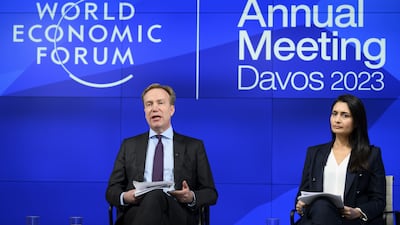Officials and economists in Davos will assess the severity of an expected global economic recession and chart ways to mitigate its impact when they meet this week during the World Economic Forum Annual Meeting in the Swiss mountain resort.
Among those attending will be Kristalina Georgieva, International Monetary Fund's managing director, Christine Lagarde, president of the European Central Bank, Bruno Le Maire, France’s Minister of Economy and economists Larry Summers and Raghuram Rajan.
Issues including soaring food and energy prices around the world and the outlook for Europe's economy will be front and centre.
“We're actually going to kick off the week on Monday with our chief economists outlook that lays out the agenda for 2023 ... the risk of recession, what may happen in terms of inflation, in terms of interest rates, and where some of the greatest opportunities lie in terms of various geographies in the global economy,” Saadia Zahidi, managing director and head of social and economic agendas at the forum, said last week.
“We will be looking also at that recession risk in the shorter term. But I think it still lies within the hands of the policymakers and leaders that will be gathered next week to put in place the right kind of growth agenda and ensure there's as little damage as possible, and a much faster recovery.”
The global economy is set for a sharp downturn this year, according to the latest projection from the World Bank.
Growth is projected to decline to 1.7 per cent in 2023, from the 3 per cent forecast six months ago, the Washington-based lender said in its latest Global Economic Prospects report released on Tuesday.
This is the third weakest pace of growth in about three decades, reflecting global monetary tightening, the effects of the Ukraine-Russia war, high inflation levels, worsening financial conditions and weaker growth in the US, China and the euro area.
"Weakness in growth and business investment will compound the already devastating reversals in education, health, poverty and infrastructure and the increasing demands from climate change," World Bank president David Malpass said last week.
The bank called for increased support for low-income countries to deal with food and energy shocks, people displaced by conflicts, and a growing risk of debt crises.
The International Monetary Fund’s latest outlook is also expected later this month.
In the US, the world's biggest economy, problems are also plaguing the technology sector — for years a fast-growth industry — with job losses under way at the biggest companies, including Amazon and Facebook parent Meta.
“There's a complex picture here ... we have to sort of embrace the full understanding of that complexity. On the one hand ... we're seeing some major headlines around certain parts of the tech sector. But much of what we'll be trying to look at next week is the emerging opportunity to deploy technology across multiple sectors, including agriculture, including education, including energy," said Ms Zahidi.
"And that actually means technology is much more ubiquitous across multiple sectors. And there's a huge opportunity there for further job creation, for further growth, especially in emerging markets, and a much more positive outlook."
To ensure this, she said, there will need to be investment to support sustainable, inclusive and resilient economic growth.
"A group of leaders from the public and the private sector will be coming together to address exactly that question, designing a framework and starting to align around that new agenda. That also includes thinking more about the markets of tomorrow, the specific areas of investment, everything from power storage, to education technologies that can create the right, resilient, sustainable and inclusive growth of the future,” said Ms Zahidi.
There will also need to be a focus on people, including on education and developing skills, otherwise "none of these opportunities can really play out, and nor will we have the kind of societal resilience that is needed to be prepared for future inevitable shocks".
The forum's 'Reskilling Revolution' initiative aims to give one billion people access to better education, skills and economic opportunity by 2030.
“We'll be announcing that we have actually crossed the milestone that we had set for ourselves three years ago, which was to reach a billion people by 2030, we should at this stage be 30 per cent of the target. And we will actually go well beyond that,” she said.
However, the picture for jobs remains uneven around the world.
“We're looking at very tight labour markets in much of the Western world. But in many emerging and developing economies, there needs to be a much greater focus on work quality, on living wages, and on putting in place job creating investments, especially for youth," Ms Zahidi said.














